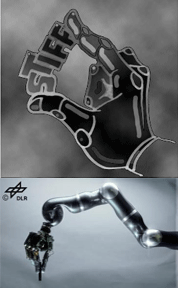STIFF is a research project on enhancing biomorphic agility
of robot arms and hands through variable stiffness & elasticity. It is
funded by the 7th framework programme
 of the European Union (grant agreement No: 231576).
of the European Union (grant agreement No: 231576).
Check our 2011 Summer School on Impedance
Institutional Partners
German Aerospace Center (DLR), Germany:
Project coordinator.
Responsible for integrating a variable-impedance robotic system in the project.
Development of a novel EMG system for human impedance measurements.
Integration of human and robotic impedance control approaches.
Technische Universiteit Delft, Netherlands:
Responsible for modelling the human neuromuscular system from muscle to
joint level. Developent of time varying system identification and
parameter estimation techniques to quantify the model parameters from
recorded data using haptic manipulators.
IDSIA, Switzerland:
Responsible for learning high-level task-specific controllers based on
reinforcement signals for the flexible variable-impedance robot arm
developed by DLR, and for inverse reinforcement learning to extract
cost functions in collaboration with UEDIN.
University of Edinburgh, United Kingdom:
Responsible for the development of 'Optimal Feedback Control'
based closed loop control paradigms, specifically tailored to redundant
and variable impedance actuators. Developing
methods to extract cost functions and comparing control policies
to evaluate improvement in performance when modulating impedance
optimally.
Université Paris Descartes - CNRS, France:
Responsible for studies of impedance control in humans,
using a variety of techniques including direct physiologicial
measurements (EMG, H-reflex), mathematical modeling and robotic
simulation. The main emphasis is 1) to suggest
biologically-inspired strategies to be applied to robotics
control and 2) to use analogies with robotic devices to better
understand human behaviour in terms of impedance.
| 




